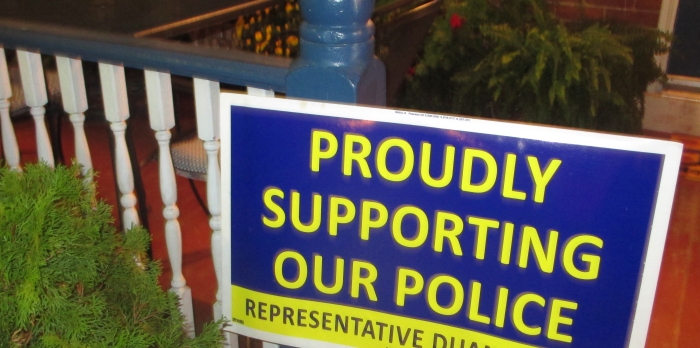The first time I heard about it was only four years ago. I was listening to an interview with Sonja Sohn, an African-American actress who played a cop on The Wire.
“My own perception of cops was that they came into your neighborhood, they roughed up people that you loved for no reason and took them away,” she said. “So I had to overcome all of that to play this cop [on The Wire].”
Wow, I thought.
In my experience, police officers were protectors of everyday citizens. I’d had no idea that the police often had a bad reputation among African-Americans. How sad that law enforcement, the people who are supposed to be the good guys, had lost the black community’s trust like this.
***
There was much more for me to learn. Only one year ago, when Freddie Gray’s death provoked unrest in Baltimore, my co-workers and I talked about it at lunch one day. Five white women and one black woman at the table.
“It’s just been happening so often lately, this police brutality against black men,” I said.
My black co-worker, my friend, looked at me. “No,” she said. “It’s been happening for a long time.”
I sucked in my breath. Of course. I had been unaware of it. But I should have known.
***
Today I see a lot of yard signs like this one.
I am grateful for the incredibly difficult work police officers do to keep order, protect citizens, and prevent and punish crime. I support their efforts to do these things justly and wisely.
But I will not join those who say “We proudly support our police,” because this simple message is too simplistic. It carries sinister implications about who is not supported. We cannot ignore those implications at a time when our society is having a long overdue conversation about excessive use of force and violence perpetrated by police, often against black men.
Each of these cases is fraught with complexity. What was the black man doing? Something illegal, something threatening, something that merely appeared to be threatening, or nothing at all? Why did the officer use force? Was it for reasonable self-defense? Was it a fearful, impulsive, knee-jerk reaction? Was it an overly fearful abuse of power fueled by racist stereotypes of “dangerous” black men? Would anything have happened differently if the officer had had more than an instant to consider the options without the pressure of fear and adrenaline?
Most important and most complex of all, why do we—police officers or not—so often see black men as suspicious and threatening?
Given this complexity, I cannot say I support police unconditionally. Like me, they have racial prejudices of varying degrees. Like me, they make flawed and unjust judgments at times.
So let’s be attentive to the complexity of police officers’ jobs, as well as the complexity of the people and neighborhoods they are meant to serve.
Let’s dig into the complexity of people who are different from us, learning their stories and listening to their perspectives.
Let’s find out what it’s like to risk your life when you’re on the job, and what it’s like to be at risk at any time, just because you’re black.
Let’s offer support not just for one monolithic side of a complex conflict, but for many people in many difficult situations.

There is much pressure on police to lower crime statistics in big cities. Police are trained to expect crime from blacks and to use excessive force to show authority. The government uses drug warfare to criminalize blacks and incarcerate them – to keep them off the streets. Thank the Lord for cell phones that shine the light on police brutality of black men and women. We cannot fathom the race problem unless we walk the streets in black skin. Comedian Louis C.K. is very vocal about racism – If you had a time machine and went to the past – as a white man, life is good in every period of history – as a black man – he is doomed! Mac posted books on this subject: The Devil in the Grove, The New Jim Crow and Just Mercy.
Alberta
Thank you so much for sharing these thoughts, Alberta. I hope white people like us can continue learning about what it’s like to be black and speaking up about racism. Black people shouldn’t be the only ones who have to call attention to this issue.